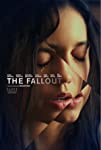Eye For Film >> Movies >> The Fallout (2021) Film Review
The Fallout
Reviewed by: Jennie Kermode

Last year, due to the Covid-19 pandemic, many US children were not attending school, so the country got a break from school shootings. In 2019 there were 25, with six people killed and dozens more injured. In 2018, there were 24, resulting in at least 35 deaths. The numbers, small though they are as a proportion of the school population, speak to unimaginable loss, yet they only tell part of the story. Beyond those killed and those left with life changing injuries are all the other people - witnesses, parents, siblings, kids who know they came very close to getting shot themselves - who experience severe emotional trauma. Most will carry something of it with them for the rest of their lives.
Vada (Jenna Ortega) is just in the middle of an ordinary day when it happens to her. She's excused herself from class to go to the toilets so she can take a phone call from her little sister about something which will, in retrospect, seem trivial. She ends up hiding there with fellow students Mia (Maddie Ziegler) and Quinton (Niles Fitch). Only the latter has seen what's happening directly - his T-shirt is covered in his brother's blood - but they all hear the shots, trying to keep still and quiet for a period of time that must seem interminable. Because of what we don't see, we're not distracted from the effect it has on them, from the expressions on their faces and those small, fast, urgent breaths. Here and in later scenes, evocative sound design puts us right there in the moment.
The bulk of the film takes place after the shooting, at the point where the police and paramedics have gone, the media circus has disbanded and outsiders expect the lives of those caught up in it to go back to normal. Vada's longstanding best friend, Nick (Will Ropp), feels that normal is the last thing they should want - that normal facilitated this - and immediately applies himself to campaigning, making media appearances to talk about gun control. Vada understands this but can't relate to it herself. Beyond fear of returning to the spaces where it happened, she doesn't seem to feel anything much. Obliged to go to a counsellor, she says that she thinks, from this, that she must be fine, but the counsellor stresses that having some kind of feeling - "anything at all" - is a prerequisite to the recovery process.
The experience of death or proximate violence on this scale is disorientating at any age but all the more so in youth, when one has so little to compare it to that it's difficult to contextualise. The only people who seem like to understand Vada's specific experience are those she shared it with, so she gravitates towards them, forgetful of prior connections. Typical trauma responses follow: impulsive behaviour, experimentation, catastrophe sex. Without a roadmap, Vada doesn't know what's happening to her. Her world shrinks into an intense present. Her family and teachers try to get the balance right in providing space and support, whilst Nick dos his best to be a non-judgemental friend. She struggles to connect with them, as if listening from underwater, whilst her interactions with Mia and Quinton become so intense that they threaten to cause further damage.
Megan Park's script presents this chaotic experience in a non-linear way which helps viewers to get inside Vada's head. Whereas in most films we're observers watching characters make decisions, here we are Vada's fellow passengers as her life seems to career along without direction. Park seamlessly interweaves elements of dance to let the bodies of the survivors express what words cannot. Ortega gives herself over completely to her role, delivering a mesmerising performance. As well as managing the strangeness of the survivor experience, she perfectly straddles the boundary between child and adult, with Vada so confident and insightful at times that it's shocking how lost she is at others, easy to forget how much she doesn't know about the world.
Credit should also go to Julie Bowen and Lumi Pollack as Vada's mother and little sister respectively, each struggling with how abruptly one of the most important relationships in their lives has changed. Vada's parents seem to recognise that she needs to be wholly focused on herself for a while in order to process what has happened, but living with it is still hard, especially in light of their own intensified protective instincts. Park finds moments of comedy in their interactions which leaven the stress on display, and despite its subject matter, the latter part of film is never really grim. Vada's heady journey makes for compelling viewing. She's charming after the fashion of an addict, liberated from conventional boundaries - and whilst most viewers will recognise that she's every bit as dangerous, one can't help but hope that she holds on to a bit of her new found spontaneity.
Lively and intelligent and brilliantly composed, The Fallout packs a punch, delivering blows that you won't see coming. Its love of life makes recognition of what has been lost all the more painful. Park wastes no time on idle sentiment or censure but delivers something that feels utterly real. Don't miss it.
Reviewed on: 18 Mar 2021















